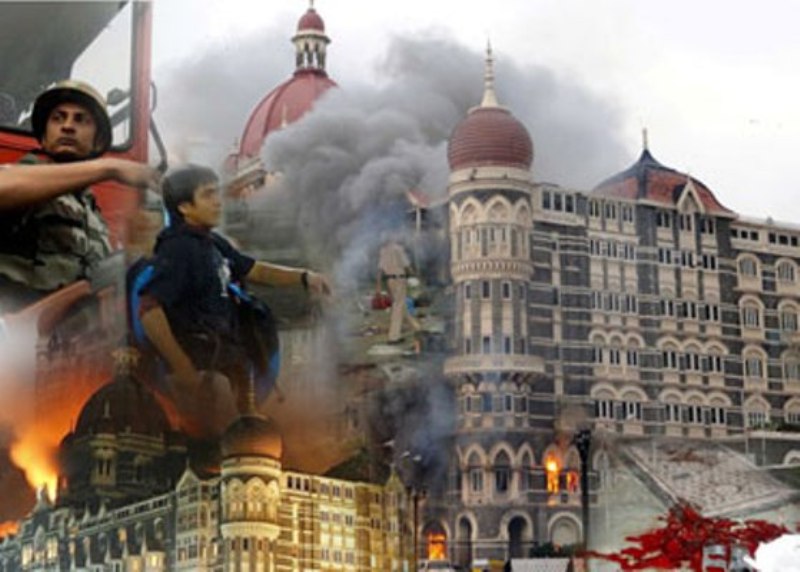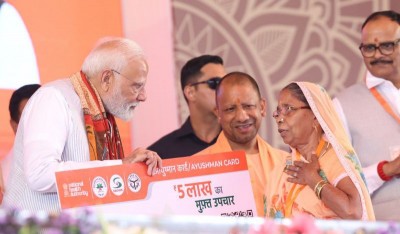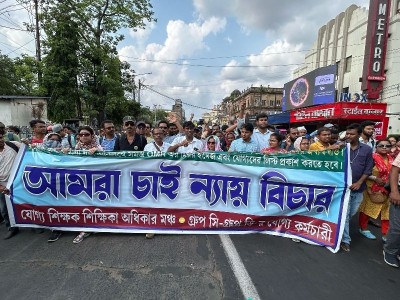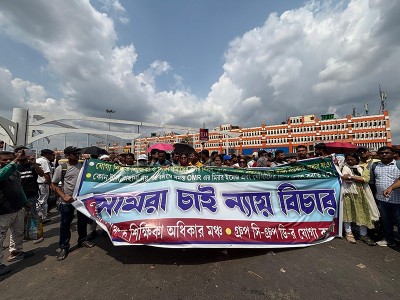 Mumbai Attacks
Mumbai Attacks
The international community’s failure to nail Pakistan twelve long years after the Mumbai terrorist attacks is unacceptable
Yesterday marked twelve years of the 26 November 2008 (26/11) Mumbai terrorist attacks that had shocked and shaken the world. The 26/11 attacks were among the most brazen, audacious and gruesome acts of terror ever witnessed. Ten terrorists belonging to the Pakistan-based-and-backed Lashkar-e-Taiba (LeT), egged on by a cocktail of handlers comprising their LeT bosses and serving officers of the Pakistani Army operating out of a control room in Karachi, unleashed burst after burst of gunfire and explosions at several different locations in downtown Mumbai. The terrorists finally besieged a high-end hotel and held hundreds of hostages there for three days. Over those three days the terrorists went from room to room, indiscriminately killing whoever they could find. At the end of the nightmare, 166 innocent people had died, as had 9 of the attackers, and more than 300 people were wounded. Among those killed and injured were nationals of countries such as the United States (US) and Israel.
Just like 9/11 did to the US, 26/11 changed India forever. The dastardly attacks still evoke deep emotions across India. The imprint of 26/11 has refused to be overshadowed by the fast moving events that have unfolded nationally and internationally over the last dozen years. All sections of Indian society, led by Prime Minister Narendra Modi, remembered and paid tribute to all those who had lost their lives in the mindless attacks, and pledged to bring the masterminds of the attacks, who were sitting pretty in Pakistan, to justice. Modi tweeted yesterday, “Today I pay obeisance to our security forces defending India, thwarting conspiracies like the Mumbai attack, and restricting terrorist activities to increasingly smaller areas”.
Other political leaders, industrialists, actors and cricketers joined a chorus of voices conveying remembrance and respect. Vice President M. Venkaiah Naidu, while saying that it was time for the world to come together to isolate nations supporting and sponsoring terrorism, wrote, “I pay my tributes to the martyrs of 26/11 Mumbai terror attack. Nation will always remember their valour and sacrifice”. One of India’s biggest industrialists, Ratan Tata, the Chairman Emeritus of Tata Sons and the Chairman of Tata Trusts, said that the wanton destruction that took place 12 years ago will never be forgotten. He added, “Today, we certainly can mourn the ones we lost and honour the sacrifice of the brave who helped conquer the enemy, but what we must applaud, is the unity and the acts of kindness and sensitivity which we should cherish, and which hopefully, will continue to shine in the years ahead”. Prominent representatives of the Mumbai-based Bollywood film industry also posted messages conveying their condolences and tributes, while the Mumbai born and bred iconic cricketer in cricket-crazy India, Sachin Tendulkar, wrote, “The wounds may have healed, but the scars remain. Of the lives lost and the sacrifices made. These shall always be a reminder of the strength of human spirit to overcome any act of adversity. Remembering all our martyrs on this day”.
Messages of support for India also came in from across the seas. The US reiterated that it stood with India in the fight against terrorism and affirmed its commitment to holding the perpetrators of the attack accountable and ensuring justice for the victims. France said that it stood together with India in combating terrorism. In Israel, functions are being organized to pay respect to the victims of the 26/11, condemn “Pakistan-sponsored terrorism”, and demand that the perpetrators of the carnage be brought to justice. Isaac Solomon, an organizer of one such event in the city of Eilat, was quoted as saying that “Israel opposes every country that provides financial and logistical support to terrorists. Peaceful countries should come together to boycott diplomatically and financially those countries that support terrorism. This will help deter acts of terror”.
French Member of the European Parliament (MEP) Thierry Mariani and Italian MEP Gianna Gancia wrote to Indian PM Modi to reinforce their backing for a common goal to address extremism and terrorism. Recollecting the violence and the tragedy of 26/11, the MEPs underlined that they have “continually raised questions to the Vice- President of the Commission/High Representative of the Union for Foreign Affairs and Security Policy, Mr. Josep Borrell, in an attempt to comprehend and enhance the European Union’s activities to prevent terrorism”, and that they have specifically “challenged the European Commission on its continual support for Pakistan, especially in regards the financing of terrorism by the Islamic Republic of Pakistan and its listing on the Financial Action Task Force grey watchlist which contravenes EU guidelines for assistance”. The MEPs asserted that “Whilst Pakistan has tried to deny its links with terrorist organizations the evidence, including United States intelligence reports, the origin of the attackers and Pakistan’s former Prime Minister Nawaz Sharif’s admission of the country’s involvement, all demonstrate, without doubt, that the Islamic Republic of Pakistan remains a global threat”. They added that “as parliamentarians, we have called for the European Union to impose sanctions on the Islamic Republic of Pakistan and on individuals; terrorists, and those supporting and promoting terrorist activities; and to condemn state sponsored terrorism”.
The whole world, barring Pakistan and its benefactor China, knows full well exactly who the perpetrators of 26/11 were. Most countries of note hesitate little while publicly and repeatedly asserting with conviction the identity of the country, Pakistan, as also the individuals involved. The plethora of evidence that has been gathered on the attacks has caused the international community, led by the US which lost six of its citizens in 26/11, to conclude that LeT chief Hafiz Saeed, LeT commander Zakiur Rehman Lakhvi, LeT deputy head of international operations Sajid Mir, and their Inter-Services Intelligence (ISI) handlers Major Iqbal, Major Samir Ali, Lt. Colonel Hamza and Colonel Shah were among the key planners and executioners of the 26/11 attacks. While it is comforting for critics of terrorism to know that the capability to accurately unearth so much of information about a clandestinely launched terror attack actually exists, it is at the same time exasperating to be faced with the harsh reality that such knowledge and conviction have little substance if they fail to compel a terror-sponsoring country such as Pakistan to bring the culprits to justice. That is a grossly unacceptable situation.
We live in an age in which respect for human rights is accorded more importance than it has ever been in human history. Arms of the United Nations (UN) such as the UN Human Rights Commission (UNHRC), national commissions for human rights that have been set up by most countries, and independent, non-governmental organizations such as Amnesty International and Human Rights Watch, are all hawk-eyed watchdogs that perform the critical role of highlighting violations of human rights across the world and demanding remedial action from the governmental authorities concerned. Overall, these organizations have done an admirable job and have without doubt contributed to a world in which abuse of human rights is less blatant and widespread than it would have been without their presence. The one area, however, in which human rights organizations may have been guilty of demonstrating less interest than they ought to have done is terrorism, especially the State-sponsored kind, and the devastating impact that it has on the victims and their families. The silence of the international human rights community on the 12th anniversary of 26/11 says all that needs to be said.
The international media, on the other hand, has over the years provided ample print space to the Mumbai attacks, and continues to do so twelve years on. Not many publications, however, have demonstrated the willingness or the moral conviction to call a spade a spade while reporting on events such as the Mumbai attacks. Use of terminology such as “which India claims was carried out by Pakistan”, followed closely by “which Pakistan refutes”, tantamount to lazy and faithless journalism. It helps no one. Furthermore, the tendency in the Western media to call out and highlight relatively smaller terrorist incidents such as those that occurred recently in France conveys the impression of a belief in the “your terrorist versus my terrorist” dichotomy. This is a dangerous belief to have, as recent history has adequately borne out. Failure to diligently, adequately and truthfully highlight all acts of terrorism, no matter where they take place or whom they target, will only encourage more terrorism. It will also, sooner rather than later, convert the “your terrorist” into “my terrorist”. The several terrorist acts carried out or attempted in recent decades in the US and across Europe by Pakistanis or elements with direct linkages to Pakistan is testimony to this inconvenient truth.
The Indian media, meanwhile, understandably sees the issue through nationalist lenses, and has often tended to focus on aspects that are no longer important or significant. A recent headline clearly illustrates this. Sections of the Indian media rejoiced while reporting that ‘Pakistan admits 11 terrorists who facilitated 26/11 Mumbai attack live on its soil’. Such reporting would imply that despite the whole of the civilized world already having accepted Pakistan’s complicity in the Mumbai attacks, as is evident from the letter of the MEPs referred to above, the insecure sections of the Indian media were still looking towards Pakistan, its deceitful ways notwithstanding, for confirmation. The stress, however, should by now have shifted to demands for Pakistani action against the expansive terrorist infrastructure created and nurtured by it, and to exerting pressure on the international community to ensure that. Top notch investigative journalism to unearth linkages between the Pakistani State and its terrorist proxies could provide the ammunition that the media needs. It is high time that the realization dawned that Pakistan, unless it is pushed into a corner in wriggling out of which it would have to pay a far dearer price than it would in imprisoning its terrorist proxies, is highly unlikely to relent vis-à-vis the Mumbai attacks, or any of the other hundreds of terrorist attacks it has overseen, for that matter.
Pakistan’s teetering on the brink of blacklisting by the Financial Action Task Force (FATF) for the last couple of years has provided a fine contemporary example of this. It was only after it became plainly obvious to Pakistan that the FATF had forced it into the unenviable position of deciding between suffering through the pain of its faltering economy or taking action against the UN-designated terrorists that it was sheltering that it moved to arrest Hafiz Saeed in July 2019. No amount of bilateral pressure from India and other democracies around the world could achieve this, as the leverages that these countries possessed with which they could actually hurt Pakistan, other than through disruptive and risky military options, were limited. It also merits mention that Hafiz Saeed’s conviction was on terror financing charges unrelated to the Mumbai attacks. The Pakistani military establishment, which was eminently culpable in the Mumbai attacks, has ensured that the trials into the attacks never really moved forward. It is unlikely to relent unless it is forced into a situation where the cost of not doing so is unpalatably high.
India’s frustration with the repeated stalling of the 26/11 trials in Pakistan was vented on 12 November, when the spokesperson of India’s Ministry of External Affairs said, “We have seen media reports in Pakistan about Pakistan's Federal Investigative Agency (FIA) releasing an updated ‘book on most wanted/high profile terrorists’ listing several Pakistani nationals involved in the 26/11 Mumbai terror attacks. While the list includes a select few members of the Lashkar-e-Tayyiba, a UN designated terror entity based in Pakistan, including the crew members of the boats used to execute the 26/11 attack, it glaringly omits the mastermind and key conspirators of the heinous terror attack. It is a fact that the 26/11 terror attack was planned, executed and launched from Pakistan's territory. The list makes it clear that Pakistan possesses all the necessary information and evidence on the conspirators and facilitators of the Mumbai terror attack based in Pakistan. The government of India has repeatedly called on the government of Pakistan to give up its obfuscation and dilatory tactics in discharging its international obligations in the Mumbai terror attacks trial. It is a matter of serious concern that despite its own public acknowledgement as well as the availability of all necessary evidence, including that shared by India, Pakistan is yet to show sincerity in delivering justice to the families of 166 victims from 15 countries across the globe, even as we near the 12th anniversary of 26/11 attacks”.
The importance that the use of terrorism has in the Pakistani scheme of things, as also the deceitful nature that the Pakistani State has imbibed and chosen to conduct its business around, were once again revealed when media reports earlier this week made the shocking disclosure that despite his conviction and sentencing to tens of years in prison for terror financing, Hafiz Saeed is no longer lodged in jail. The reports suggest that after an initial period of imprisonment in the high-security Kot Lakhpat jail, an action aimed solely at assuaging the FATF, Saeed has been shifted to his home in Johar Town in Lahore. He is spending his time in protective custody, and enjoys the freedom of hosting visitors at home. Among his visitors last month was Zakiur Rehman Lakhvi, another of the main architects of 26/11.
India’s External Affairs Minister S. Jaishankar had a few weeks ago underscored that while the international community had created a range of mechanisms to counter terrorism, it still lacked a comprehensive convention on international terrorism as members of the UN were “wrestling with certain foundational principles”. Jaishankar opined that the “struggle against terror and those who aid and abet it is a work in progress”, adding that “It remains for the international system to create the necessary mechanisms to shut down the structures that support and enable terrorism, whether in South Asia or across the globe”. The international response to 26/11 and the inability of that response to ensure justice for the victims and their families clearly suggest that all is not well, and that much remains to be done.
As Dr. Paul Stott, Fellow at EFSAS, aptly summed up in an article titled ‘Nature and impact of Mumbai attacks’ that appeared in the Sunday Guardian Live last week, “The Mumbai attacks were a hideous crime. But they, and the responses to them, serve as a snapshot, an illustration of the world as it is. And that world can be very ugly”.
Support Our Journalism
We cannot do without you.. your contribution supports unbiased journalism
IBNS is not driven by any ism- not wokeism, not racism, not skewed secularism, not hyper right-wing or left liberal ideals, nor by any hardline religious beliefs or hyper nationalism. We want to serve you good old objective news, as they are. We do not judge or preach. We let people decide for themselves. We only try to present factual and well-sourced news.







